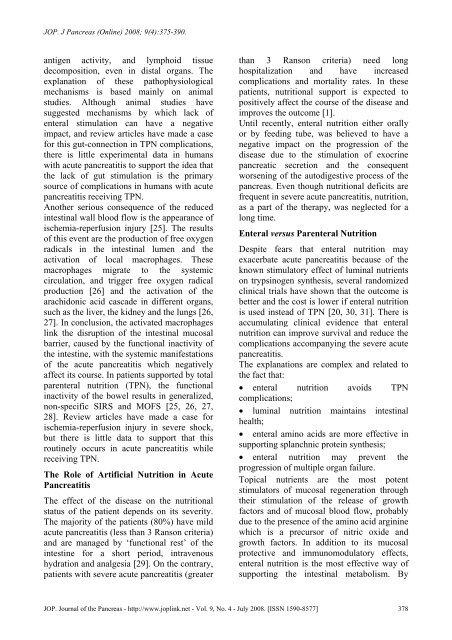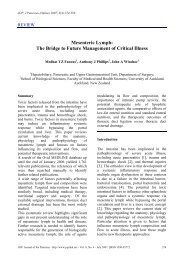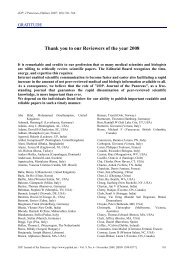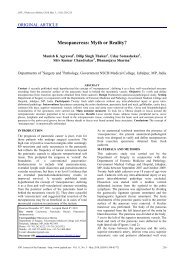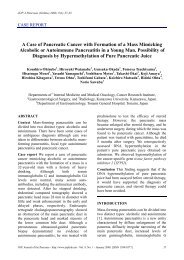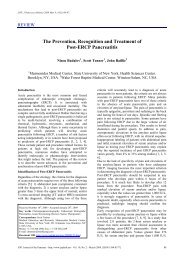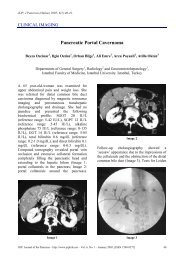Nutrition Support in Acute Pancreatitis - JOP. Journal of the Pancreas
Nutrition Support in Acute Pancreatitis - JOP. Journal of the Pancreas
Nutrition Support in Acute Pancreatitis - JOP. Journal of the Pancreas
You also want an ePaper? Increase the reach of your titles
YUMPU automatically turns print PDFs into web optimized ePapers that Google loves.
<strong>JOP</strong>. J <strong>Pancreas</strong> (Onl<strong>in</strong>e) 2008; 9(4):375-390.<br />
antigen activity, and lymphoid tissue<br />
decomposition, even <strong>in</strong> distal organs. The<br />
explanation <strong>of</strong> <strong>the</strong>se pathophysiological<br />
mechanisms is based ma<strong>in</strong>ly on animal<br />
studies. Although animal studies have<br />
suggested mechanisms by which lack <strong>of</strong><br />
enteral stimulation can have a negative<br />
impact, and review articles have made a case<br />
for this gut-connection <strong>in</strong> TPN complications,<br />
<strong>the</strong>re is little experimental data <strong>in</strong> humans<br />
with acute pancreatitis to support <strong>the</strong> idea that<br />
<strong>the</strong> lack <strong>of</strong> gut stimulation is <strong>the</strong> primary<br />
source <strong>of</strong> complications <strong>in</strong> humans with acute<br />
pancreatitis receiv<strong>in</strong>g TPN.<br />
Ano<strong>the</strong>r serious consequence <strong>of</strong> <strong>the</strong> reduced<br />
<strong>in</strong>test<strong>in</strong>al wall blood flow is <strong>the</strong> appearance <strong>of</strong><br />
ischemia-reperfusion <strong>in</strong>jury [25]. The results<br />
<strong>of</strong> this event are <strong>the</strong> production <strong>of</strong> free oxygen<br />
radicals <strong>in</strong> <strong>the</strong> <strong>in</strong>test<strong>in</strong>al lumen and <strong>the</strong><br />
activation <strong>of</strong> local macrophages. These<br />
macrophages migrate to <strong>the</strong> systemic<br />
circulation, and trigger free oxygen radical<br />
production [26] and <strong>the</strong> activation <strong>of</strong> <strong>the</strong><br />
arachidonic acid cascade <strong>in</strong> different organs,<br />
such as <strong>the</strong> liver, <strong>the</strong> kidney and <strong>the</strong> lungs [26,<br />
27]. In conclusion, <strong>the</strong> activated macrophages<br />
l<strong>in</strong>k <strong>the</strong> disruption <strong>of</strong> <strong>the</strong> <strong>in</strong>test<strong>in</strong>al mucosal<br />
barrier, caused by <strong>the</strong> functional <strong>in</strong>activity <strong>of</strong><br />
<strong>the</strong> <strong>in</strong>test<strong>in</strong>e, with <strong>the</strong> systemic manifestations<br />
<strong>of</strong> <strong>the</strong> acute pancreatitis which negatively<br />
affect its course. In patients supported by total<br />
parenteral nutrition (TPN), <strong>the</strong> functional<br />
<strong>in</strong>activity <strong>of</strong> <strong>the</strong> bowel results <strong>in</strong> generalized,<br />
non-specific SIRS and MOFS [25, 26, 27,<br />
28]. Review articles have made a case for<br />
ischemia-reperfusion <strong>in</strong>jury <strong>in</strong> severe shock,<br />
but <strong>the</strong>re is little data to support that this<br />
rout<strong>in</strong>ely occurs <strong>in</strong> acute pancreatitis while<br />
receiv<strong>in</strong>g TPN.<br />
The Role <strong>of</strong> Artificial <strong>Nutrition</strong> <strong>in</strong> <strong>Acute</strong><br />
<strong>Pancreatitis</strong><br />
The effect <strong>of</strong> <strong>the</strong> disease on <strong>the</strong> nutritional<br />
status <strong>of</strong> <strong>the</strong> patient depends on its severity.<br />
The majority <strong>of</strong> <strong>the</strong> patients (80%) have mild<br />
acute pancreatitis (less than 3 Ranson criteria)<br />
and are managed by ‘functional rest’ <strong>of</strong> <strong>the</strong><br />
<strong>in</strong>test<strong>in</strong>e for a short period, <strong>in</strong>travenous<br />
hydration and analgesia [29]. On <strong>the</strong> contrary,<br />
patients with severe acute pancreatitis (greater<br />
than 3 Ranson criteria) need long<br />
hospitalization and have <strong>in</strong>creased<br />
complications and mortality rates. In <strong>the</strong>se<br />
patients, nutritional support is expected to<br />
positively affect <strong>the</strong> course <strong>of</strong> <strong>the</strong> disease and<br />
improves <strong>the</strong> outcome [1].<br />
Until recently, enteral nutrition ei<strong>the</strong>r orally<br />
or by feed<strong>in</strong>g tube, was believed to have a<br />
negative impact on <strong>the</strong> progression <strong>of</strong> <strong>the</strong><br />
disease due to <strong>the</strong> stimulation <strong>of</strong> exocr<strong>in</strong>e<br />
pancreatic secretion and <strong>the</strong> consequent<br />
worsen<strong>in</strong>g <strong>of</strong> <strong>the</strong> autodigestive process <strong>of</strong> <strong>the</strong><br />
pancreas. Even though nutritional deficits are<br />
frequent <strong>in</strong> severe acute pancreatitis, nutrition,<br />
as a part <strong>of</strong> <strong>the</strong> <strong>the</strong>rapy, was neglected for a<br />
long time.<br />
Enteral versus Parenteral <strong>Nutrition</strong><br />
Despite fears that enteral nutrition may<br />
exacerbate acute pancreatitis because <strong>of</strong> <strong>the</strong><br />
known stimulatory effect <strong>of</strong> lum<strong>in</strong>al nutrients<br />
on tryps<strong>in</strong>ogen syn<strong>the</strong>sis, several randomized<br />
cl<strong>in</strong>ical trials have shown that <strong>the</strong> outcome is<br />
better and <strong>the</strong> cost is lower if enteral nutrition<br />
is used <strong>in</strong>stead <strong>of</strong> TPN [20, 30, 31]. There is<br />
accumulat<strong>in</strong>g cl<strong>in</strong>ical evidence that enteral<br />
nutrition can improve survival and reduce <strong>the</strong><br />
complications accompany<strong>in</strong>g <strong>the</strong> severe acute<br />
pancreatitis.<br />
The explanations are complex and related to<br />
<strong>the</strong> fact that:<br />
• enteral nutrition avoids TPN<br />
complications;<br />
• lum<strong>in</strong>al nutrition ma<strong>in</strong>ta<strong>in</strong>s <strong>in</strong>test<strong>in</strong>al<br />
health;<br />
• enteral am<strong>in</strong>o acids are more effective <strong>in</strong><br />
support<strong>in</strong>g splanchnic prote<strong>in</strong> syn<strong>the</strong>sis;<br />
• enteral nutrition may prevent <strong>the</strong><br />
progression <strong>of</strong> multiple organ failure.<br />
Topical nutrients are <strong>the</strong> most potent<br />
stimulators <strong>of</strong> mucosal regeneration through<br />
<strong>the</strong>ir stimulation <strong>of</strong> <strong>the</strong> release <strong>of</strong> growth<br />
factors and <strong>of</strong> mucosal blood flow, probably<br />
due to <strong>the</strong> presence <strong>of</strong> <strong>the</strong> am<strong>in</strong>o acid arg<strong>in</strong><strong>in</strong>e<br />
which is a precursor <strong>of</strong> nitric oxide and<br />
growth factors. In addition to its mucosal<br />
protective and immunomodulatory effects,<br />
enteral nutrition is <strong>the</strong> most effective way <strong>of</strong><br />
support<strong>in</strong>g <strong>the</strong> <strong>in</strong>test<strong>in</strong>al metabolism. By<br />
<strong>JOP</strong>. <strong>Journal</strong> <strong>of</strong> <strong>the</strong> <strong>Pancreas</strong> - http://www.jopl<strong>in</strong>k.net - Vol. 9, No. 4 - July 2008. [ISSN 1590-8577] 378


